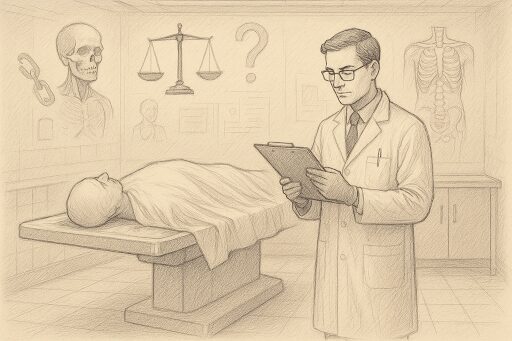The Weight of Unanswered Questions
Sarah Martinez clutched the phone with trembling hands as the coroner’s office delivered their final verdict. Her 32-year-old brother had died suddenly at home, and the official cause of death remained “undetermined.” The medical examiner’s brief report left her family with more questions than answers. Sarah’s mother couldn’t sleep, haunted by the possibility that a medical condition might have been overlooked. Her father wondered if their family carried genetic risks that doctors had missed.
When Sarah mentioned considering a private autopsy, her uncle immediately objected. “Those things are illegal,” he insisted. “Besides, they’ll just butcher the body and charge you thousands for nothing.” Sarah’s aunt nodded in agreement, adding, “The government already did their job. Private doctors can’t do anything different.”
These reactions reveal how private autopsy myths persist in families facing their most vulnerable moments. Misconceptions about private autopsy services create unnecessary barriers when people need answers most. Understanding private autopsies requires separating fact from fiction, particularly when grief clouds judgment and misinformation spreads quickly.
Legal Myths and Regulatory Realities
The Legality Question That Haunts Families
The most persistent myth suggests private autopsies violate legal boundaries. Families often believe they need government permission or special court orders to pursue independent examinations. This misconception stems from confusion about autopsy regulations and the difference between mandatory and optional procedures.
Private autopsy legality operates under clear regulatory frameworks in every state. Medical examiners perform autopsies when deaths occur under specific circumstances: unexplained deaths, suspected homicides, accidents, or deaths in custody. These mandatory examinations serve legal and public health purposes. However, families retain autopsy family rights to seek additional examinations through qualified pathologists.
The truth about private autopsies reveals a well-established medical practice operating within legal boundaries. Board-certified forensic pathologists who perform private examinations must maintain the same credentials as their government counterparts. They follow identical scientific protocols and adhere to the same professional standards that govern all medical practice.
Regulatory Oversight and Professional Standards
Private autopsy services operate under strict medical licensing requirements. Each pathologist must hold valid medical licenses, complete specialized forensic training, and maintain continuing education credentials. State medical boards oversee these professionals with the same scrutiny applied to hospital-based physicians.
The regulatory framework ensures quality control through multiple layers of oversight. Professional medical associations establish practice guidelines, while state agencies monitor compliance with health and safety standards. Insurance requirements and malpractice coverage provide additional consumer protections that many families don’t realize exist.
The Invasiveness Misconception
Physical Concerns That Keep Families Away
Maria Santos faced an impossible choice. Her teenage son died in a car accident, and the official autopsy concluded the crash caused his death. However, Maria suspected a medical episode triggered the accident. She wanted answers but feared a private examination would further damage her son’s body.
“Are autopsies invasive?” Maria asked the funeral director. The question reflects a common concern that prevents families from seeking crucial information. Many people visualize autopsy procedures as destructive processes that mutilate bodies beyond recognition. This misconception creates emotional barriers that compound grief with unnecessary worry.
The autopsy procedure reveals careful, methodical examinations performed by skilled medical professionals. Forensic pathologists use precise surgical techniques designed to gather maximum information while preserving dignity. Modern autopsy methods minimize visible impact, allowing families to proceed with planned funeral arrangements without disruption.
Technical Precision and Restoration
Private pathologists employ sophisticated techniques that limit external evidence of examination. Strategic incision placement, careful tissue handling, and thorough restoration procedures ensure bodies remain suitable for viewing and funeral services. The process resembles surgical procedures performed in hospitals, with similar attention to precision and care.
Contemporary autopsy methods incorporate advanced imaging technology that reduces invasiveness while increasing diagnostic accuracy. Digital radiography, CT scanning, and specialized photographic documentation provide detailed information without extensive physical examination. These technological advances address family concerns while maintaining scientific rigor.
Cost and Value Misconceptions
The Financial Fear Factor
James Rodriguez received a quote for a private autopsy that made him question the entire process. The $3,000 estimate seemed excessive for what he assumed would be a simple examination. His sister argued they were being exploited during a vulnerable time, suggesting private services deliberately overcharge grieving families.
This reaction illustrates how cost misconceptions about private autopsies create additional stress for families already dealing with financial pressures. Many people lack reference points for autopsy pricing, making any amount seem unreasonable. The absence of insurance coverage for elective procedures compounds these concerns.
Private autopsy facts reveal pricing structures that reflect the complexity and expertise required for thorough examinations. Costs include pathologist fees, laboratory testing, microscopic analysis, toxicology screening, and comprehensive report preparation. The time investment often exceeds 20 hours of professional work, from initial examination through final documentation.
Value Proposition and Long-term Benefits
The investment in private autopsy services extends beyond immediate answers to long-term family benefits. Genetic information discovered through examination can guide medical care for surviving relatives. Insurance claims, legal proceedings, and estate matters often require detailed medical documentation that private examinations provide.
Families who pursue private autopsies frequently report that the information justifies the expense. Clear explanations of death causes eliminate uncertainty, reduce family conflicts, and provide closure that proves invaluable over time. The comprehensive reports serve as permanent medical records that benefit multiple family members across generations.
Quality and Credibility Concerns
The Expertise Question
Common autopsy myths suggest private pathologists lack the training and resources available to government medical examiners. This misconception positions private services as inferior alternatives that compromise scientific accuracy for profit. Families worry that private examinations might miss crucial evidence or provide unreliable conclusions.
The reality reveals that many private pathologists previously worked in medical examiner offices, bringing identical training and experience to independent practice. Board certification requirements ensure consistent expertise across all forensic pathology practice settings. Many private practitioners maintain higher caseload quality by limiting volume and focusing on thorough examination protocols.
Equipment and Laboratory Access
Private autopsy services typically utilize the same laboratory networks and diagnostic equipment that serve hospital systems and government agencies. Advanced testing capabilities include toxicology screening, genetic analysis, microscopic examination, and specialized disease detection. Many private facilities maintain equipment that exceeds what’s available in some public morgues.
The competitive nature of private practice often drives investment in cutting-edge technology and continuous professional development. Private pathologists frequently participate in research projects, publish scientific papers, and contribute to medical education programs. This involvement ensures they remain current with evolving forensic techniques and diagnostic methods.
Timing and Availability Myths
The Urgency Misconception
Autopsy misconceptions often center on timing requirements that don’t actually exist. Families believe they must decide immediately after death or lose the opportunity for private examination. This false urgency creates pressure that prevents careful consideration of available options.
Private vs public autopsies differ significantly in timing flexibility. While medical examiner offices operate under legal deadlines and administrative schedules, private services accommodate family needs and circumstances. Bodies can be examined days or even weeks after death, depending on preservation conditions and family requirements.
Scheduling and Accessibility
Private autopsy services offer scheduling flexibility that public agencies cannot match. Families can arrange examinations around funeral planning, travel requirements, and emotional readiness. This accommodation reduces stress and allows for thoughtful decision-making during difficult periods.
The availability of private services has expanded significantly, with qualified pathologists practicing in most metropolitan areas. Telemedicine consultations allow families to discuss cases with specialists regardless of geographic location. Transportation services ensure that distance doesn’t prevent access to quality examination services.
Documentation and Reporting Standards
The Thoroughness Factor
Dr. Patricia Chen completed her private autopsy report with meticulous attention to detail. The 40-page document included photographs, diagrams, laboratory results, and comprehensive explanations written in language families could understand. This thoroughness contrasts sharply with the brief reports that government agencies typically provide.
Private autopsy reports often exceed public examination documentation in both length and clarity. Private pathologists recognize that families need comprehensive explanations to process complex medical information. The additional time investment in report preparation reflects the service-oriented nature of private practice.
Communication and Follow-up
Private practitioners typically provide extensive consultation time to explain findings and answer family questions. This personalized approach differs from public agencies that operate under time and resource constraints. Families receive detailed explanations of medical terminology, diagnostic procedures, and examination results.
The ongoing availability of private pathologists for questions and clarification provides long-term value that public agencies cannot match. Families can contact their pathologist months or years later when questions arise or when additional information becomes relevant to family medical decisions.
Understanding the Reality of Private Autopsy Services
The myths surrounding private autopsy services create unnecessary barriers that prevent families from accessing valuable medical information. Legal concerns, invasiveness fears, cost misconceptions, and quality doubts all stem from incomplete understanding of how private autopsy services actually operate.
Private autopsy legality operates within established medical practice frameworks that protect both families and practitioners. Professional standards ensure quality care, while regulatory oversight provides consumer protection. The investment in private services often proves worthwhile when families need comprehensive answers that public examinations cannot provide.
Understanding private autopsies requires recognizing them as legitimate medical services that complement rather than compete with public health functions. When families face unanswered questions about unexpected deaths, private examination services provide accessible options that respect both scientific rigor and family needs.
The decision to pursue private autopsy services should be based on accurate information rather than persistent myths. Families deserve access to all available medical resources when seeking answers about their loved ones’ deaths. Separating fact from fiction allows for informed decisions that serve both immediate needs and long-term family interests.








